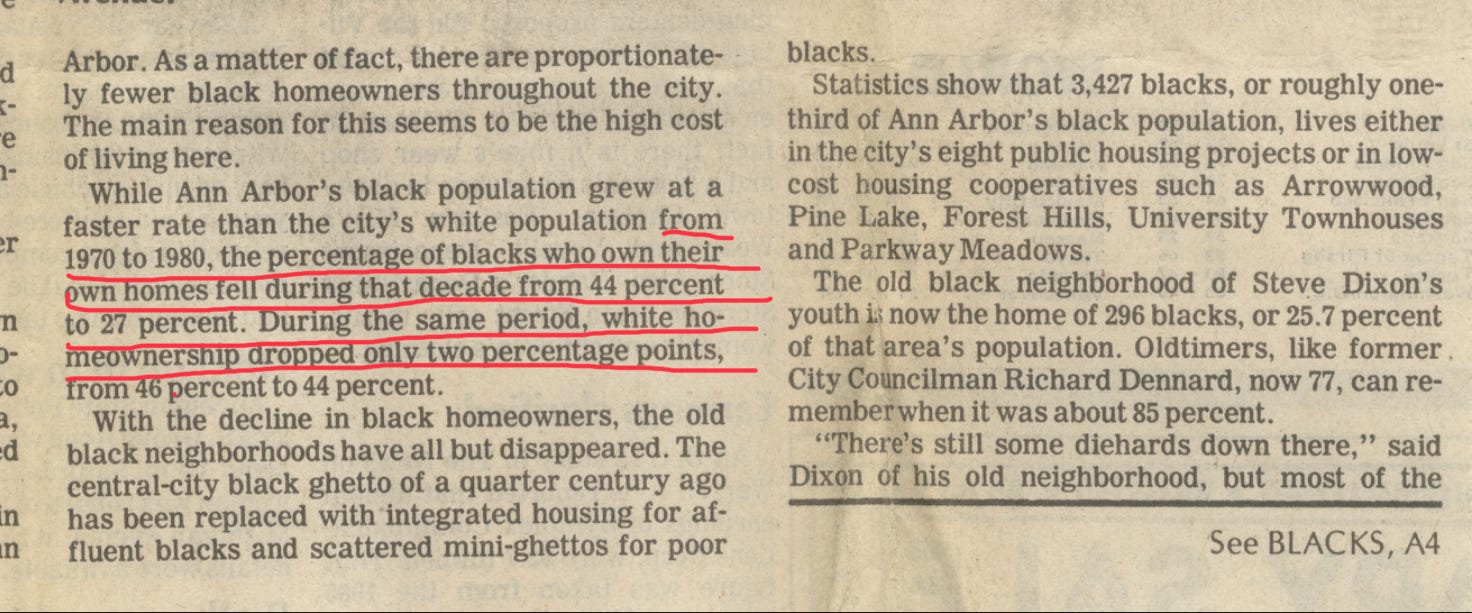Municipal Reparations in Ann Arbor
Could Start With Investment in Black-Owned Businesses
Here are my remarks in support of municipal reparations given during an #A2Council public hearing for the FY2023 Budget
Good evening mayor and council. I’m Greg Pratt from Ward 3 in East Ann Arbor and a volunteer with Survivors Speak re: CA17 and DC 2. It’s nice to see that we are talking about debt service for 350 S 5th and affordable mortgages via the NACA program. Speaking of debts owed… we’re asking, with the proposed budget before you today, to use some of the General Fund dollars to bring black-owned businesses downtown, providing spaces like an incubator. We think providing leases for Black-owned businesses at a deeply reduced cost could go a long way toward beginning a program of municipal reparations.
What are we repairing?
We are beginning a process to materially repair the damage our white-dominated society and local community have done to the people who built our country. We mean, literally built it. We know the stats, we know the outcomes we know the disparities that exist and we know that in Ann Arbor, housing supply was restricted for so long that we are now decades behind demand for housing and here’s the key piece of that…demand at each level of affordability from zero income to market rate/ area median income level.
We also know that in order to get housing for folks making $40K and less per year, we need to *directly invest in it* like we are doing with our housing millage. So thanks to all residents who voted for millage in 2020. That was a good step to take. And we are seeing tangible results already with that investment. But it’s not enough. So…
Why should we implement reparations at the local/ municipal level?
We cannot wait for the gridlock in DC to untangle itself.
We should strive to change legislation and precedent at the state and federal levels of government that as Brooke Simone puts it in her recent article in the Michigan Law Review titled “Municipal Reparations: Considerations and Constitutionality”:“...reparations should not be confined by an anticlassification approach that stifles hope of remediating structural racism.”
However, we should not let precedent and legislation at the state and federal stop us from acting locally like we have done with the affordable housing millage…while we cannot solve the entire housing crisis with direct investment in housing affordable to people making $0 to $40K/yr, we can do our part.
We did that in 2020. And I am grateful we live in a city that supports investment in our fellow working class citizens of all stripes. If we can figure out a way to do our part in funding affordable housing, we can also figure out a way to start a program of reparations for American Descendants of Slaves and Freedpersons. Let’s try it out by supporting initiatives that will empower black business development and ownership. Perhaps a partnership of sorts with the forthcoming Avalon/Artspace development on 4th/Catherine?
I look forward to hearing your thoughts.
Thanks for your time. Look for Survivors Speak on Facebook, Instagram and survivorsspeak.info on the web. We will also be covering this on eastannarbor.com which is a new local politics and outreach newsletter I publish every Sunday 10am on substack. Subscriptions are free, delivered to your Sunday morning email inbox. Thanks for your time and for your service on council.
appendix 1
This is a screen cap of a portion of an Ann Arbor News article from 1986 about the dispossession/gentrification of black residents

For anyone having difficulty reading the text underlined in red it says, “…from 1970 to 1980, the percentage of blacks who own their own homes fell during that decade from 44 percent to 27 percent. During the same period, white homeownership droppedonly two percentage points from 46 percent to 44 percent.
